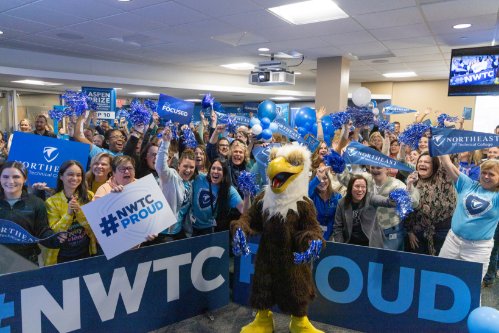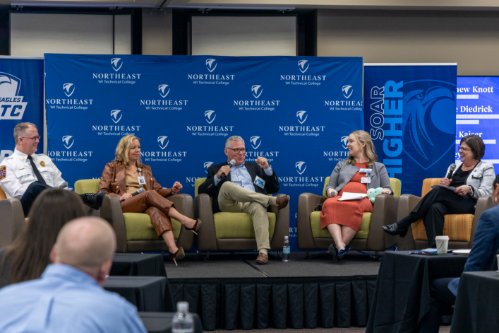When Green Bay Area Public School District (GBAPS) administrators wanted to hire classroom support staff, they didn’t just post the positions and wait for applications to trickle in. Instead, they connected with Northeast Wisconsin Technical College (NWTC) and created a program flowing with opportunities.
GBAPS and NWTC developed the Paraeducator Program, an 18-month training program that wrapped up earlier this month. The grant-funded project enabled a cohort of 14 part-time GBAPS employees to earn NWTC’s Foundations of Teacher Education (FTE) associate degree for free and become eligible to fill full-time, benefited paraeducator and substitute teaching positions. Several participants have already moved into new positions.
“GBAPS has exceptional employees already within the organization. We needed to find a new and creative way to support career growth,” said Amy Fish, GBAPS associate director of community partnerships and grants. “I believe the participants were all seeking career advancement, but for many there was a financial barrier to obtaining the necessary credentials. This opportunity to earn a free associate’s degree is life changing for the participants and a huge help for our district.”
Sometimes called paraprofessionals, teacher assistants, or instructional aides – paraeducators play a vital role in today’s K-12 classrooms. Collaborating with licensed teachers, paraeducators provide extra support and instruction to the students who need it most. Often working with students with special needs or language barriers, they help make classrooms more inclusive.
“Being part of this program really opened my eyes to the needs students have and the shortage of educators to meet those needs,” said Buffy Moravetz, project participant. “Our whole cohort is an amazing group of women dedicated to filling those gaps and supporting students any way we can within the district.”
After completing the degree, graduates can now go from working three hours a day at $17 per hour to full-time work at about $22 per hour, plus benefits.
“This inspires generational changes,” said Fish. “Each one of the participants is an inspiration to their families and students to continue their education and achieve their dreams.”
A celebration for participants and their families was held last night at NWTC Green Bay. The event also recognized the impact of the Paraeducator Program on the community.
“There is always a huge demand/need for paraeducators, especially in the Green Bay district,” said Tracy Blahnik, NWTC FTE instructor. “What better way to fulfill that need than with employees of the district who are committed to staying in the Green Bay community? This is a perfect example of the ‘growing your own’ movement.
“Students will now bring training they learned from the FTE curriculum into their local schools – for example, techniques in reading, math, and supporting English learners and students with disabilities. The associate degree is also a pathway for students who want to continue on to earn their bachelor's in education or special education.”
A flexible program with powerful outcomes
Due to grant requirements, Paraeducator Program participants needed to complete the FTE associate degree in 18 months rather than the typical two years. To meet that goal, NWTC redesigned the curriculum into five-week program courses and offered classes two evenings a week at Green Bay West.
“This project opened training opportunities where they may not have previously existed. From the accelerated course design, to offering the classes in the evening and onsite, it served as a model framework for flexible delivery to provide post-secondary educational opportunities to all,” said Scott Anderson, NWTC dean of Health Sciences and Education.
For these busy working women who participated in the program, spending two evenings a week away from their families was not easy. But the long-lasting benefits outweigh the temporary sacrifices.
“This program was a lot of hard work and took up a lot of our time, but for me, it was definitely worth it,” said participant Billie Fischer. “I have already been hired as a building paraprofessional and work in my school's mindfulness room, where I am able to work closely with students and get to know them on a more personal level.”
Another powerful outcome of the program’s cohort model: the strong bond quickly formed by the participants.
“I have made lifelong friends during this time and value each and every one of them for their energy, compassion, and drive that pulled us all together to succeed in this program,” said Moravetz.
“I think the biggest growth we've seen is the bond they've created,” Fish added. “These ladies have been together twice a week for nearly two years. They've shared personal struggles and leaned on each other for support. They are each other's greatest champions and have formed strong friendships in this program. Now that many of them have moved into new positions, I have heard how they are so happy in their new roles, and not just for a financial impact but truly loving the work they are doing.”
Learn more about NWTC degree pathways in education. Visit nwtc.edu/Education.
About the project’s funding
The Paraeducator Program was funded by the Wisconsin Fast Forward Industry Sectors Worker Training Grant through Department of Workforce Development. DWD focuses on economic impact and increased wages for trainees. This program afforded each of the participants the opportunity for a sustainable increase in their hourly rate of pay, along with 37.5 hours of work per week. Through their funding, participants did not have to pay for tuition or books.
The funds also paid for a coordinator to support the cohort throughout the project. Per grant requirements, GBAPS offered a 50% matching component that included facility space for participants to complete coursework, laptops, Wi-Fi routers, allowing staff to complete practicum hours during the workday, and administration/grant oversight.
In addition, the Women's Fund of Green Bay awarded a grant enabling each participant to apply for a special education license.



